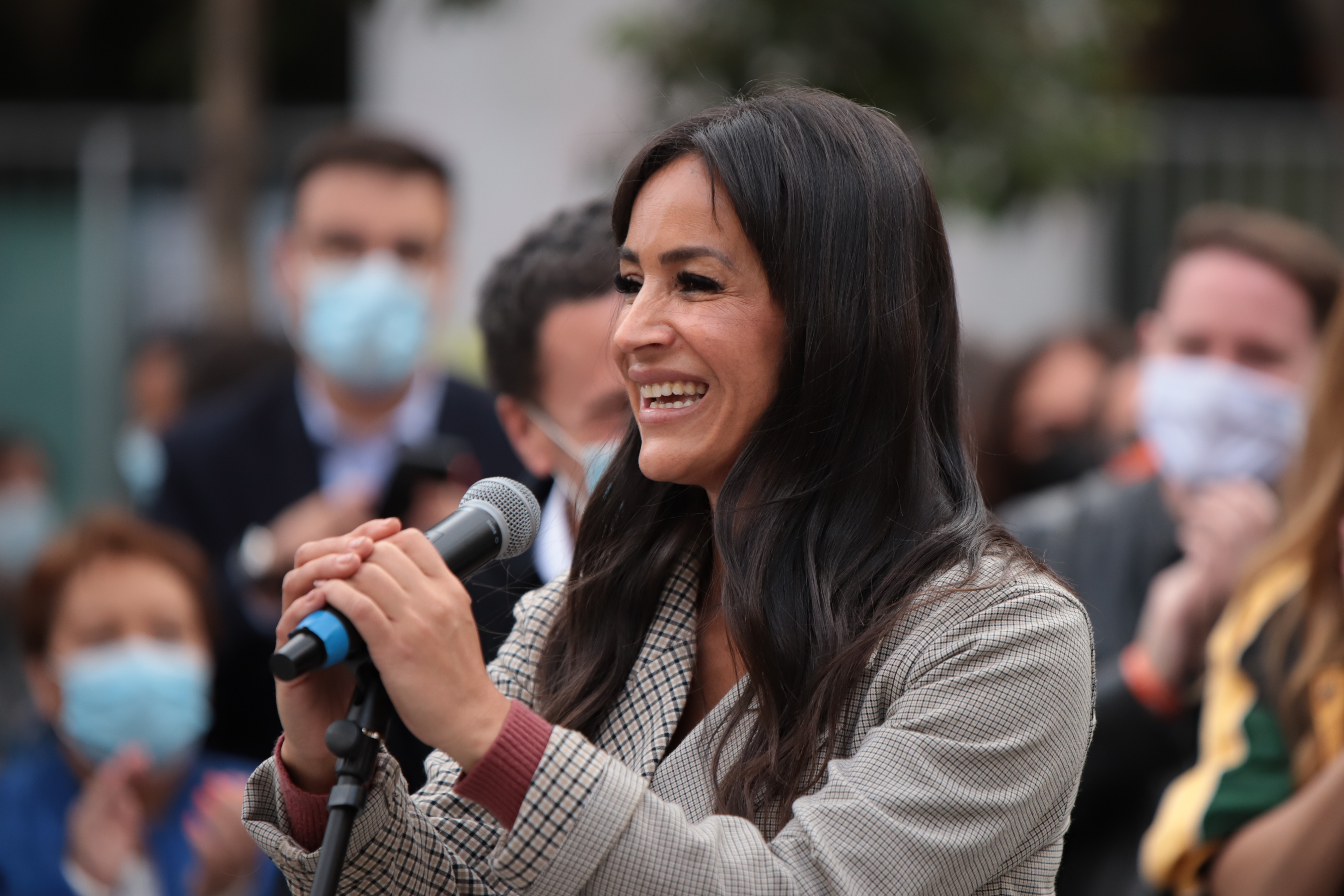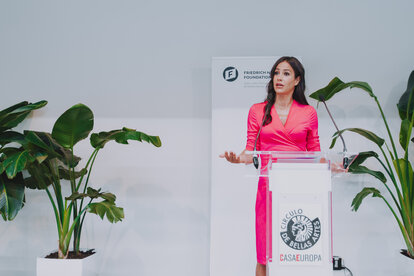Liberal leaders
Towards a new multiparty system

Begoña Villacís, Deputy Mayor of Madrid (Ciudadanos)
© Thomas Holbach, CC BY-SA 4.0For three decades since the restoration of democracy in 1978, the Spanish political system was configured as what political scientists call an "imperfect bipartisanship". Although the electoral system was, and is, proportional and not majoritarian, the combination of the "D'Hondt law" as a method of seat allocation and the size and number of deputies in each constituency produce in practice a "semi-majoritarian" effect. This means that the two main parties -historically, the socialist and the conservative- have a great advantage over third and fourth national forces. If traditionally the main victim of the system was IU (Eurocommunist-Green), in the last decade other parties have suffered its effects, particularly Ciudadanos.
The origin of this balance, so detrimental to political pluralism, and so contrary to the basis of a supposedly proportional model, is to be found in certain features of Spanish political history. On the one hand, the system of the Restoration established by Antonio Cánovas del Castillo and enshrined in the Constitution of 1876 -let us not forget, the longest-lived in our history after the current Constitution- was based on several principles, of which the most characteristic was probably "el Turno": that is, the alternation agreed between the Conservative party of Cánovas himself and the Liberal party of Práxedes Mateo Sagasta. As is well known, this “turnism” was articulated on the basis of directed electoral processes, and of a pro-fundamental corruption, which counted on the "cacique" as the leading figure. Nevertheless, the Turn managed to pacify Spanish political life to a certain extent for four decades, affecting the process that is usually the most traumatic: the transfer of power. And although in the end it did not survive the turbulence following the revolutionary days of 1917 and the failures in the colonial wars, the paradigm of “turnism” has left a deep imprint on the Spanish consciousness.
After the end of the Restoration and the dictatorship of Primo de Rivera, a republican regime was established in Spain and aroused enormous hopes in both the intellectual and popular classes, who joined mass politics for the first time. However, the political system of the Second Republic had enormous problems in integrating pluralism and managing the transfer of power between the left and right-wing blocs. The Second Spanish Republican experience ended tragically in July 1936 with the seditious military uprising, and gave way to the Civil War and a dictatorship that for nearly 40 years eliminated all traces of political pluralism not contained in the so-called "families" of the Regime.
For all these reasons, when the time came to articulate the democratic transition, both the example of the stability of the shift, and the negative of the electoral system and the difficulties to accept the pluralism of the Second Republic had a great weight. In addition, an attempt was made to make it easier for the party-system of the moment, the Union of the Democratic Center, to have a certain advantage over communists and socialists, for the sake of the "stability" of the new democracy. For this reason, in the electoral law, the distribution of constituencies and seats favored the interior provinces, less populated and traditionally more conservative, over the big cities and the coast.
In practice, after the collapse of the UCD and the poor results of a Communist Party that had led the fight against the dictatorship, the political system of the transition ended up pivoting around the PSOE and Alianza Popular, the conservative coalition from which the Partido Popular would end up being born. Minor roles correspond to IU, the left-wing coalition that includes the PCE; and for a time, to the CDS, the center party founded by former president Adolfo Suarez after the collapse of the UCD.

Begoña Villacís, Deputy Mayor of Madrid (Ciudadanos) at the FNF Madrid Autumn Reception, November 2022.
© FNF MadridIn essence, this has been the prevailing scheme in Spanish politics until the 2010s. The "imperfect bipartisanship" has given stability to Spanish democracy, yes, but in exchange for installing very serious vices and eroding the principle of proportionality and the equality of the vote of all Spaniards. The lack of competition for socialists and conservatives has favored the emergence of clientelist networks and corruption; it has reduced the variety of options and the breadth of public policies available, preventing innovation in the public sector; it has allowed an often obscene distribution of institutions and all kinds of public and semi-public entities; and it has prevented accountability and electoral punishment for all the above behaviors. Suffice it to check the degree of delegitimization to which PSOE and PP have brought the General Council of the Judiciary in their eagerness to control it. In short, a "cartelized" democracy in which the two main parties exchange cards and share the State as a booty to the detriment of all citizens.
But in addition, the electoral penalization of the third and fourth national forces, added to the ease with which nationalist and pro-independence parties can obtain generous representations by concentrating the vote in a few constituencies, has led to forces contrary to the unity of the nation and the equality of citizens acting as veto players and arbitrators of the central government. The current legislature of Pedro Sánchez is the extreme example, with a stable alliance that includes not only the pro-independence ERC but also a party heir to the terrorist group ETA; but it should be remembered that the PP has also frequently engaged in this logic of disintegration: the largest transfers of powers to the Catalan Generalitat took place after the "Majestic Pact" between José María Aznar and Jordi Pujol.
It was precisely the tension provoked by the cessions to the nationalists that caused the first rupture in the center of the party system since the disappearance of Suárez's CDS. In 2006, Ciudadanos was founded in Barcelona by a group of moderate left-wing intellectuals. In the following years it will be seen that in the new party a social-democratic soul and a more liberal one coexist. In 2008 UPyD entered the Congress of Deputies for the first time with a deputy, Rosa Díez, from the PSOE. It was just the beginning.
In that same year of 2008, the effects of the global financial crisis began to manifest themselves in a resounding manner, which in Spain worsened due to the real estate bubble and the bankruptcy of the system of savings banks -public banks which, of course, were managed above all by the two big parties of the system and their networks of supporters. The Socialist government first denies the crisis and then clings to the effects of the spending plan with which it has tried to combat it (Plan E); but in May 2010 it is forced to freeze pensions and cut civil servants' salaries and benefits. Public opinion made him pay for it, and President Rodríguez Zapatero disappeared from the scene as a ghost during the last year and a half of the legislature. Precisely one year after the cuts, in May 2011, the outbreak of the movement of the "indignados", the 15M, marked a new step in the breakdown of the Spanish party system.
The response to the crisis of the PP government provokes mobilizations on the left, which, given the discredit of the PSOE, begins to articulate itself in radical and anti-system discourses. From this breeding ground was born Podemos, a supposed party-movement in its beginnings, which was nourished by university professors and veteran left-wing activists. As the legislature progressed, the media uncovered cases of corruption in the Partido Popular, which multiplied discontent and gave wings to the "new parties". In 2014, Podemos and Ciudadanos entered the European Parliament. The following year both forces burst into the general elections: Podemos more focused on economic malaise and an ideological and moralistic interpretation of corruption; Ciudadanos with a technocratic air and capitalizing on the desire for reform and cleaning up of the national middle classes.

Begoña Villacís, Deputy Mayor of Madrid (Ciudadanos) at the LGTBI FNF Madrid event, June 2020.
© FNF MadridThe result of December 2015 produces a deadlock in the Congress of Deputies that is only resolved with new elections, from which Mariano Rajoy emerges strengthened. However, his majority is still insufficient, so the Partido Popular will have to negotiate a legislature agreement with Ciudadanos. This is the first example of stable collaboration between two national parties. Although Ciudadanos does not enter the government, it serves as parliamentary support and brings forward two budgets, introducing new policies such as the wage supplement for young people or the extension of paternity leave. This is a virtuous collaboration that allows to get the country out of the deadlock, to give it a stable but supervised government and to promote public policies that the old political actors had not considered before.
At the autonomous level there is also the collaboration of the new parties. Ciudadanos supports the PSOE government in Andalusia since 2015 with the demand to fight endemic corruption and open the economy. In 2018, a new cycle opens when the liberal party enters to govern in the Andalusian community together with the PP, ending 40 years of socialist hegemony and giving a new impulse in terms of economic dynamism and institutional cleanliness. Coalitions of government between liberals and conservatives also took place in Castilla y León and Madrid, opening stages of economic growth, regeneration and accountability.
The virtuous collaboration also extends to the municipal level. After several decades of conservative hegemony and a failed government of the left, practicing between 2015 and 2019 a sectarian and clientelist policy, the representatives of Ciudadanos Madrid enter the municipal government with the Partido Popular. José Luis Martínez Almeida is appointed mayor and I assume the position of deputy mayor. Since then, and knowing everything that separates us in terms of ideas, political culture, ambition and transparency, we have achieved a loyal collaboration that has resulted in a city government that is more transparent, innovative and open to Europe and the world. The achievements of these last three years would not have been possible with a single-color government, especially if we consider the vices and tendencies of the Spanish bipartisanship.
And the achievements are there for all to see. We have unblocked urban developments that had been stalled for decades under conservative and left-wing governments. We have increased transparency and accountability, even in such delicate moments as the pandemic. And we have returned to the international scene, projecting Madrid to its natural place as the great metropolis of Southern Europe and the privileged link with America.
While this was happening in the city of Madrid and in some autonomous communities, the Spaniards have also been able to see the most unpleasant face of a misunderstood multi-partisanship. The national government has been in the hands of nationalist, pro-independence or left-wing extremist parties since 2018, who openly declare that they aspire to end the current constitutional period in Spain, and who meanwhile dedicate themselves to disassemble and vampirize the State. This circumstance, together with the emergence of a populist right-wing party, Vox, has generated a political polarization that has swept away the center and threatens the very coexistence of Spanish society.
The delicate moment that the "new parties", Ciudadanos and Podemos, are going through, each one for a particular combination of reasons, threatens to lead to a new bipartisanship, with citizens who, although they disbelieve the old socialist and conservative parties, find no other refuge from instability and political weariness than to return to them. In Ciudadanos, we are aware that, no matter how many mistakes have been made in recent years, a return to the "turnism" between PSOE and PP would be a waste of the opportunity for a true democratic, economic and social reform in Spain.
For this reason, we have undertaken a process of refoundation that draws on the successful experiences of numerous European liberal parties, such as the FDP. From a process of listening to the militants and positions and to the Spanish society, we will do everything in our power to revitalize an existing space, that of reformist liberalism, which is not only necessary in the current context, but essential to achieve a more modern Spain, more prosperous and with a thriving middle classes and participants in public life. Multipartyism and political pluralism in our country are here to stay, regardless of whoever it may concern.
